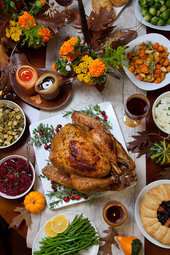A brief look at where seasonal meal ingredients come from
By Diego Flammini
Assistant Editor, North American Content
Farms.com
Families throughout Canada will celebrate Thanksgiving this weekend, surrounded by loved ones and delicious meals.
Of all the things people have to be thankful for, farmers should be close to the top of the list. Because without farmers, our holiday dinner tables would remain empty.
If someone was to cross Canada looking for some Thanksgiving dinner ingredients, where would they go?

Turkey
No Thanksgiving meal is complete without turkey. According to the Ministry of Agriculture, Ontario and Quebec produce the most turkey in the country. In 2015, Canada produced 171.4 million kilograms (kg) of turkey; approximately 109 million kg were from Ontario and Quebec. Last year, each person in Canada ate about 4.2 kg of turkey.
Potatoes
Prince Edward Island remains the potato capital of Canada. In 2014, Canada produced more than 4.6 million tonnes of potatoes, and PEI accounted for 1.186 million tonnes. During that year, farmers in PEI harvested an average of 32.51 tonnes per acre.
Cranberries
When it comes to cranberries, farmers in British Columbia and Quebec do the heavy lifting. According to the 2013 Crop Profile for Cranberry in Canada, 6,946 hectares were cultivated. Quebec producers cultivated 3,622 hectares, comparted to B.C.’s 2,636. New Brunswick is a smaller cranberry production location. Farmers in that province cultivated about 362 hectares in 2013.
Carrots
If carrots are part of Thanksgiving dinner, farmers in Ontario and Quebec can be thanked. According to the Ministry of Agriculture’s 2012 Crop Profile for Carrots, the two provinces accounted for 75 per cent of the national production. In 2012, a total of 8,610 hectares of carrots were planted.
Whatever ingredients end up on the dinner table this Thanksgiving, farmers should be thanked for their hard work in producing our food.